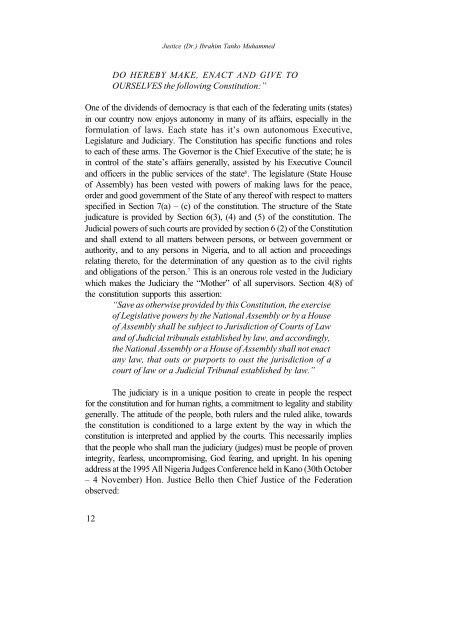Shari'a Implementation in Nigeria - Peace Palace Library
Shari'a Implementation in Nigeria - Peace Palace Library
Shari'a Implementation in Nigeria - Peace Palace Library
Create successful ePaper yourself
Turn your PDF publications into a flip-book with our unique Google optimized e-Paper software.
Justice (Dr.) Ibrahim Tanko Muhammed<br />
DO HEREBY MAKE, ENACT AND GIVE TO<br />
OURSELVES the follow<strong>in</strong>g Constitution:”<br />
One of the dividends of democracy is that each of the federat<strong>in</strong>g units (states)<br />
<strong>in</strong> our country now enjoys autonomy <strong>in</strong> many of its affairs, especially <strong>in</strong> the<br />
formulation of laws. Each state has it’s own autonomous Executive,<br />
Legislature and Judiciary. The Constitution has specific functions and roles<br />
to each of these arms. The Governor is the Chief Executive of the state; he is<br />
<strong>in</strong> control of the state’s affairs generally, assisted by his Executive Council<br />
and officers <strong>in</strong> the public services of the state 6 . The legislature (State House<br />
of Assembly) has been vested with powers of mak<strong>in</strong>g laws for the peace,<br />
order and good government of the State of any thereof with respect to matters<br />
specified <strong>in</strong> Section 7(a) – (c) of the constitution. The structure of the State<br />
judicature is provided by Section 6(3), (4) and (5) of the constitution. The<br />
Judicial powers of such courts are provided by section 6 (2) of the Constitution<br />
and shall extend to all matters between persons, or between government or<br />
authority, and to any persons <strong>in</strong> <strong>Nigeria</strong>, and to all action and proceed<strong>in</strong>gs<br />
relat<strong>in</strong>g thereto, for the determ<strong>in</strong>ation of any question as to the civil rights<br />
and obligations of the person. 7 This is an onerous role vested <strong>in</strong> the Judiciary<br />
which makes the Judiciary the “Mother” of all supervisors. Section 4(8) of<br />
the constitution supports this assertion:<br />
“Save as otherwise provided by this Constitution, the exercise<br />
of Legislative powers by the National Assembly or by a House<br />
of Assembly shall be subject to Jurisdiction of Courts of Law<br />
and of Judicial tribunals established by law, and accord<strong>in</strong>gly,<br />
the National Assembly or a House of Assembly shall not enact<br />
any law, that outs or purports to oust the jurisdiction of a<br />
court of law or a Judicial Tribunal established by law.”<br />
The judiciary is <strong>in</strong> a unique position to create <strong>in</strong> people the respect<br />
for the constitution and for human rights, a commitment to legality and stability<br />
generally. The attitude of the people, both rulers and the ruled alike, towards<br />
the constitution is conditioned to a large extent by the way <strong>in</strong> which the<br />
constitution is <strong>in</strong>terpreted and applied by the courts. This necessarily implies<br />
that the people who shall man the judiciary (judges) must be people of proven<br />
<strong>in</strong>tegrity, fearless, uncompromis<strong>in</strong>g, God fear<strong>in</strong>g, and upright. In his open<strong>in</strong>g<br />
address at the 1995 All <strong>Nigeria</strong> Judges Conference held <strong>in</strong> Kano (30th October<br />
– 4 November) Hon. Justice Bello then Chief Justice of the Federation<br />
observed:<br />
12
















